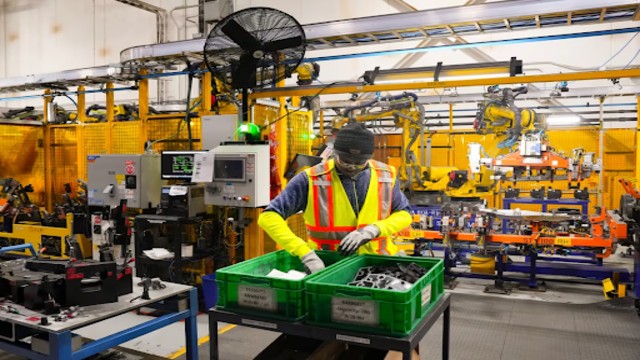
An employee works on the production line at the Martinrea auto parts plant in Woodbridge, Ont., on Feb. 3. The facility supplies parts to auto plants in both Canada and the U.S. (Chris Young/The Canadian Press)
The U.S. has imposed a 25% tariff on finished vehicles imported into the country, marking one of the most severe trade measures yet under President Donald Trump. The auto tariffs, set to take effect on April 3, will extend to some auto parts within weeks and could cover all parts in the future.
This move threatens hundreds of thousands of Canadian jobs in the auto sector—one of Canada’s largest industries and its second-biggest export to the U.S., following oil.
Trump’s Message: Build in the U.S. or Face Tariffs
Trump made his intentions clear. Speaking from the Oval Office, he urged automakers to shift production to the U.S. rather than face high tariffs.
"All we're doing is saying you can't come in unless you build here," Trump declared, signaling the end of decades-long free trade in the North American auto industry.
This goes beyond previous trade disputes, including Trump’s tariffs on energy, steel, and aluminum. The auto industry is Canada’s most valuable manufacturing sector, making these tariffs particularly damaging.
Canadian Leaders React: Calls for Retaliation
The news sparked strong reactions from Canadian political leaders.
Liberal Leader Mark Carney condemned the tariffs as a betrayal of the Canada-U.S.-Mexico Agreement (CUSMA) and promised a $2 billion package to support the auto industry. He also hinted at potential retaliatory measures against the U.S.
"This is a violation of our trade agreement, and a response will happen soon," Carney stated.
Conservative Leader Pierre Poilievre urged Trump to stop his "trade war," blaming Canada’s weak leadership for the situation. He emphasized the need for trade diversification and lower taxes to protect Canadian businesses.
Meanwhile, NDP Leader Jagmeet Singh called the tariffs a "full frontal attack on autoworkers." He demanded retaliatory tariffs and emergency support for affected workers.
"We’ve got to fight back like hell," Singh declared, criticizing Carney for not recalling Parliament before the election to pass worker protection measures.
Ontario Premier: “We Won’t Roll Over”
Ontario Premier Doug Ford also voiced his frustration, saying Canada must hit back with tariffs that “maximize the pain” for the U.S. He blamed Trump for creating chaos but reassured Canadians that "we aren’t going to roll over."
Experts Warn of Long-Term Damage
Trade experts argue that Trump’s tariffs violate the spirit of CUSMA, the very agreement he helped negotiate.
Fraser Johnson, an auto industry expert at Western University, called this a dangerous shift from 60 years of stable trade.
"The U.S. is losing credibility as a reliable trading partner," he warned.
Johnson noted that Canada’s auto sector is deeply integrated with the U.S., and reshoring production will take years, meaning both countries will suffer in the short term.
Uncertainty Looms Over the Auto Industry
Flavio Volpe, head of the Automotive Parts Manufacturers’ Association, highlighted the crippling uncertainty the tariffs create for investors.
"Trump moves the sticks twice a day. You never know what to expect," he said.
Canada has historically been a unique trading partner for the U.S., buying more American cars and parts than it sells. However, with Trump's escalating protectionist policies, the auto industry now faces a critical turning point.















